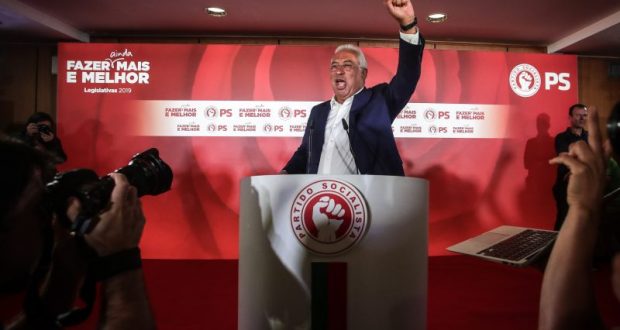By Pedro, an ISA reporter in Portugal
As the six-year alliance between left reformist parties Bloco de Esquerda (Left Bloc) BE and Partido Comunista Português (Portugese Communist Party) PCP and the pro-capitalist PS was brought to an end, the snap general elections in Portugal of January 30th produced a further weakening of the parliamentary left: the PS obtained a majority on its own, while the left parties suffered substantial losses and both the far-right party Chega and the ultra-liberal Iniciativa Liberal (Liberal Initiative) IL have risen considerably. As capitalists prepare new attacks on workers’ living conditions, the workers’ movement needs to go on the offensive for real improvements for the workers and poor.
Social crisis
The moderate economic growth registered in Portugal in the years preceding the pandemic was based on tourism, low wages, flexible contracts, housing speculation, and underinvestment in public services, leading to growth in the private service industry. Even though the minimum wage has increased, the average wage has not followed the same trend, being outpaced by inflation, mostly in housing prices. Precarity, low wages, degradation of public services, and high rents were already devastating the lives of workers before the pandemic. In fact, over the last decade, housing prices have increased 4.5 times more than wages in Portugal, mainly due to the liberalisation of the housing market and the rise in tourism. The housing crisis is particularly acute in the urban centres, pushing working families out and into overcrowded flats with lower living conditions.
As is the case everywhere else, to this is added the effect of the pandemic. The relatively fragile and dependent nature of the Portuguese economy, together with its dependence on tourism, mean that it has been hit particularly hard by Covid-restrictions and the decrease in consumption of the last two years, with an official loss of 173,000 jobs, an 8.4% drop in GDP in 2020 and only a 4.9% estimated recovery in 2021. The “lay-off policy” guaranteeing only two thirds of workers’ wages of companies allegedly out of activity due to the pandemic, some of them still working, has meant a brutal decrease in workers’ revenues.
A lot of bosses have taken advantage of the crisis to sack or replace workers with cheaper labour. According to the latest official data, 19.8% of the population (out of a total population of around 10 million) is at risk of poverty or social exclusion, with 500,000 of them being active workers. The revenue distribution inequality index has risen from 8.1 in 2019 to 9.8 in 2020. Besides the economic effects, working-class families have suffered the most from school closures and the lack of health protection measures in workplaces, public transport, and nursing homes. Moreover, the pandemic restrictions have guaranteed that generally, workers have been dealing with all these problems mostly in an isolated manner, without collective resistance.
Portugal obtained relative success with the high COVID vaccination rates achieved in 2021 (89% of the population fully vaccinated), attributed to the high degree of confidence that the Portuguese population still has in public healthcare and health science. This success benefits the popularity of the government and the prime minister Costa. However, this doesn’t reflect in any way a good management of the pandemic by capitalists and their government or a robust health service. In fact, before massive vaccination, in the winter of 2021, Portugal had amongst the highest COVID mortality rates in the world, with up to 300 daily COVID deaths in a country of only 10 million people, which is also linked to the fuel and energy poverty in the country (mostly due to the lack of thermal isolation and heating at home) that claims thousands of victims every winter.
The government has shown itself incapable of a systematic reinforcement of the public health service (SNS) and has instead pushed health workers to just work more and more without any better conditions or a consistent training and recruitment policy. As a result, in addition to the long-lasting problems of public service degradation and covid, we’re seeing an acute crisis in the National Health Service with high numbers of doctors quitting the public service in favour of jobs with better conditions in the private sector. This process is part of the growth of private health services and leads especially to a decreasing quality of health services for those with least resources.
“The Contraption” and its political crisis: the consequences of class conciliation
All the above has taken place despite the country having since 2015 a PS (‘Socialist’ Party, the pro-capitalist social democratic party) government, albeit without a parliamentary majority and thus dependent in parliament on support from the left parties: the BE (Left Block) and the PCP (Portuguese Communist Party). This arrangement has been called “the Contraption” (‘Geringonça’ in Portuguese). It was formed after the brutal austerity years of the troika (International Monetary Fund, European Central Bank, and European Commission) and the right-wing government that was in power before 2015.
For the leaders of the Left parties, the formation of the Contraption had as its first aim avoiding the continuation of a right-wing government and to reverse some of its austerity policies. Some concessions to the left were possible due to the lower unemployment rates and better economic situation in 2015–2019 than in previous years: the minimum wage was increased from 485 €/month in 2014 to 705 €/month in 2022, fares on public transport were decreased, as well as electricity bills for the poorest families. Therefore, a significant part of the working class and middle layers have sympathy for the Contraption and thus currently prefer a PS government rather than the right-wing parties who brutally attacked living conditions between 2011 and 2015.
At the same time, the Contraption never endangered any capitalist interests, and has actually proved to be a guarantee of stability for capitalist accumulation, promoting class conciliation after the austerity years. Despite approving annual state budgets together with the left parties, the PS has allied itself to the right-wing to safeguard capitalist interests on numerous occasions: including for the injection of billions in private banks or for the maintenance of the labour law and the house rental laws of the troika years. The privatisations of the previous governments have not been reverted. Precarity is still generalised, public services have remained severely underfunded with tragic consequences in the functioning of health services and schools while wage increases have been swallowed by price hikes.
Faced with the pandemic crisis, the government has on every occasion placed capitalist profiteering above public health and the lives of the masses. Both the state budget and social security have been used to directly and indirectly fund companies with millions of euros, while paying less to workers under the “lay-off policy”. This constitutes a huge transfer of revenue from workers to capital while at the same time endangering the stability of the social security system by depleting its reserves, preparing its potential future privatisation. While the public health service was under incredible stress due to the pandemic, private healthcare has been able to take advantage of the situation, raking in record profits and increasing its market share, while the masses were let suffer
Workers struggles and strikes had been increasing before the pandemic and, particularly in 2019, the government violently repressed strike action in a manner not seen since the end of the dictatorship in 1974, through all sorts of dirty tricks: minimum mandatory services set at 100%, police and military crossing picket lines to replace strikers, judicial attacks on new unions, even the persecution and arrest of strikers.
All the while, BE and PCP remained committed to the stability of the government. More strikingly, these parties restricted themselves to parliamentary work, never once even raising the idea of mass actions to pressure the minority government and conquer victories. In particular the PCP used its influence over the most important trade union federation (CGTP) to put a brake on the development of struggles.
Not even the right to strike has been properly defended and has sometimes been attacked by leaders of these parties, such as when a well-known BE member was the loudest voice against the strikes in the Volkswagen factory or when the leaderships of the PCP and CGTP attacked the truck drivers’ union. The commitment of the leadership of both the BE and PCP to the stability of the PS government is based on illusions around how to ‘better manage capitalism’. Their policies of class conciliation have led them down a path of betrayal of workers and youth. In the process, they’ve even dropped all systemic criticisms on repayment of the public debt, the Euro and the EU, losing any anti-establishment appeal and leaving any systemic opposition to the government’s policies to the Right and in particular to the rising far-right.
The leaders of these parties expected to be rewarded for their parliamentary influence over the PS government through the Contraption and thus expected that influence to grow, even hoping to take part in the government, as Unidas Podemos has done in the Spanish state. The opposite happened. As BE and PCP have not been able to distinguish themselves from the PS, many have attributed the few benefits of the Contraption to the party in power, thus benefiting the popularity of the PS and the prime-minister Costa. Many feel disappointed by BE and PCP and turned to demoralisation and abstention, already palpable in every election since 2015.
The abandonment of class struggle by these parties has been translated into a certain demoralisation of activists and trade-unionists who lost their political reference point. On some occasions, workers have started organising outside the traditional structures, creating new combative trade unions, even if sometimes with elements of confusion and falling prey to opportunist leaderships, as in the case of the right-wing (member of PSD) leader of the Nurses’ Order or the bourgeois lawyer who led the truck drivers’ union.
This steady decline in influence and electoral support was the main factor leading BE and PCP to reject the PS government’s budget for 2022, bringing down the government and leading to snap elections. As we analysed in 2019, the apparent stability of the minority PS government was only superficial (https://internationalsocialist.net/en/2019/10/elections-in-portugal). Another factor was the re-emergence of workers’ struggles in the autumn of 2021, after the break induced by the pandemic, including important strikes in the transport sector. As such, the pressure of the masses has made the leaders of these parties realise that their existence and influence is in serious danger if their position in the Contraption is maintained. At the same time, in the negotiations of the government budget for 2022, the PS showed no willingness to make any concessions to the left on changes in the labour law or on investment in the public health service.
Finally realising that their influence and parliamentary existence were in serious danger, BE and PCP took the opportunity to reject the budget for the first time in 6 years, provoking a political crisis. They broke the Contraption knowing that they would probably lose votes in the short term but hoping that either new elections would convince Costa, leader of the PS, to include them in government, as they insistently asked for, or that they might in the future recover the lost votes and influence as left opposition.
Costa could have tried to get the budget passed with support from the main right-wing opposition party PSD but preferred to go for new elections. Even if the Contraption satisfied the interests of the capitalist class to an extent — allowing for the accumulation of profits under social stability for 6 years — they wanted more reforms and less influence from the left. A successful bet: the PS won a parliamentary majority with 41,50% and 119 MP’s (out of a total of 230), winning over a lot of votes from the BE and PCP.
Reorganisation of the Right
The parliamentary elections of January 30th saw an increase in turn-out from 48.57% in 2019 to 52.19%. However, it’s mainly the parliamentary Right (PSD+CDS+IL+Chega) that increased their votes, conquering more than 500,000 votes in slightly more than two years, despite still being 650,000 votes behind the parliamentary ‘Left’. As a whole, the Right has taken these votes from the PS, from new voters, and from abstentions.
The traditional right-wing parties (the main capitalist party PSD and the catholic conservative CDS-PP) have actually been in a deep crisis ever since the end of their austerity government in 2015. The Contraption maintained the most structural policies of the previous right-wing government, such as the labour law and the house rental law, with the PS government carefully watching over capitalist interests. However, since any new austerity and liberalisation counter-reforms would be thoroughly unpopular with a majority of the working class and middle layers due to the memory of their last government, PSD and CDS have not been able to pose any consistent political alternative to the PS government.
CDS-PP has seen its support drop to only 1.61%, winning no MPs for the first time since 1975, when parliamentary democracy started in Portugal. It has thus become an irrelevant party. The crisis of PSD is less easily understandable, as it is still the preferred party of the bourgeoisie when it’s time to implement counter-reforms. In the last two weeks of the electoral campaign the capitalist media had clearly taken a position in support of the PSD and its leader Rio against the PS and Costa. This may have gotten the PSD to obtain some votes from “centrist” PS voters.
However, Rio opened the door to supporting a possible minority PS government, aiming at a stable implementation of counter-reforms, which made him lose votes to his right flank. On the other hand, he attacked workers’ victories of the previous years, such as the increase in the minimum wage, and opened the door to ruling with the support of the two more recently emerged right-wing parties: the ultra liberal IL (Liberal Initiative) and even the far-right Chega. This threat of a right-wing government containing the far-right mobilised support for PS while the vote for PSD only grew marginally, even losing a seat in parliament, going down to 78 MPs.
However, the Right and its reactionary goals aren’t dead. As the global capitalist crisis that affects Portugal leads to further social polarisation, some sectors of the petty-bourgeoisie see every right won by workers and every victory of the working class, especially those gained in the previous years, such as the increase in minimum wage, as an obstacle to their social position and profits. In the absence of an alternative by the workers movement and the left they turn to the most reactionary ideas and feed the rise of the far-right, usually promoted by a wing of the capitalist class. By providing support to the management of capitalism by the PS, the strategy of the left parties BE and PCP has been contributing to this rise of the right and the possibility of a future reactionary and authoritarian government.
The far-right party Chega (meaning “Enough!” in Portuguese) only elected 1 MP in 2019 but has used this position to propagate the most reactionary ideas, to divide the working class and deviate its attention from class struggle and to attack the weakest in society. Its leader Ventura gives voice to the nationalist, racist and sexist positions of some sectors in society. Chega’s program consists of attacks on wages and other democratic and labour rights, attacking the poorest members of the working class who receive social subsidies and repressing workers.
In the last 2 years, Ventura has brought such repulsive demands as segregation of the Roma people, cutting hands off robbers and the castration of paedophiles into the public debate. At the same time, Chega has been able to appear at some points during the pandemic crisis as representative of part of the petty-bourgeoisie whose interests have been harmed by the lockdown restrictions. Despite some antifascist actions and the eagerness of the masses demonstrated in the antiracist demonstration of June 2020, the far-right still hasn’t been clearly pushed back through mass mobilisation and unity, as the left leaderships have refused to organise with that aim.
As a result, Chega has increased its electoral support to 7.15%, with the election of 12 MPs, becoming the third biggest party in parliament! Without a doubt, Chega will use its reinforced position to further promote its reactionary ideas and prepare for the violent defence of capitalist interests. At the same time, the far-right still doesn’t have a significant implantation among the working class in Portugal, as most of Chega’s votes come from the most reactionary layers of the bourgeoisie and petty-bourgeoisie, who previously abstained or supported PSD or CDS, especially in rural areas. However, if the pro-capitalist policy of the PS government is allowed to continue uncontested, the influence of Chega may still increase.
The other new and rising right-wing party is IL (Liberal Initiative). Given the incapacity of PSD to acquire massive support for neoliberal reforms, the capitalist class has formed a new party, smaller but more daring in its proposals. Unlike the other right-wing parties, and in order to attract the youth, IL has dropped the traditional catholic positions on the issues of abortion and LGBT+ rights. Instead, it openly defends the selfish interests of the richest in society, and has been focusing on promoting neoliberal ideas such as a flat tax, dramatic cuts in public spending and number of public employees, the full privatisation of the health and education sectors, no limitations on working hours, the reduction of minimum wage and softening environmental protection. It climbed from 1 elected MP to 8, more than either the BE or PCP have left. The majority of these votes come from the richest towns and neighbourhoods in the country, mostly from well-off urban youth, that didn’t previously vote or supported either PSD or CDS.
IL and Chega both represent a radicalisation and reorganisation of the Right, as the most selfish and reactionary layers in society are becoming increasingly organised. This process can be expected to deepen in the near future.
Decline of the parliamentary Left and new PS majority
The growing radicalisation on the left is still largely lacking political representation. Even if 3.001 million people (voters of PS+BE+PCP+PAN+Livre — the Left and so called ‘Left’ parties) mobilised to the ballot box to avoid the danger of a right-wing government including the influence of IL and Chega, the incapacity of BE and PCP to present an alternative to the PS government, resulted in a ‘useful vote’ for the PS.
Without any strong political program, Costa’s popularity has benefitted from the concessions to the left of previous years, relative economic stability and the lowest unemployment rate in the last 10 years. Aside from that, he benefited from being the incumbent during the pandemic, as many voters favour stability in emergency situations, as well as from the radicalization of the Right and the weakness of the parliamentary Left. He has even benefited from the political crisis, as the capitalist media has promptly blamed it on BE and PCP. The PS obtained 2.3 million votes, an increase of 436,000 votes with respect to 2019.
The BE and PCP, together, lost 164,000 votes between 2015 and 2019 and 340,000 votes in the last two years. The BE is down from 19 MPs in 2015 to 5 now and the PCP from 17 to 6, even if the BE still has slightly more votes. Despite having rejected the government’s budget proposal, calling for a new labour law and increased investment in public health care, BE and the PCP used their electoral campaign to ask the PS for further parliamentary agreements and even for their inclusion in government, without showing how this would be any better than the last 6 years. They never campaigned as an alternative to the PS government with a combative united front of the Left and an independent program in defence of the working class. As a result, there was no perspective of building themselves as mass workers’ parties or a socialist alternative in these elections.
No longer requiring support from the left and confronted with more right wing propaganda in parliament, the PS government’s policies can be expected to turn further to the right. Indeed, bankers and the presidents of the big employers’ federations are openly celebrating the new PS majority, as they expect it to provide counter-reforms in the next 4 years that would make the working class pay for the capitalist crisis triggered by the pandemic and assure stable long-term profits. Partial privatisations in the health, education and pension fund sectors are on the table, together with fiscal reforms that benefit investments and profits.
However, passivity should not be expected from the masses. Social discontent is clearly rising and workers’ struggles already made a comeback last autumn. With the detachment of BE and the PCP from the government, some unions led by these parties may resume more activity as well. The PS government will now have the challenge of implementing capitalist policies while containing mass mobilizations in a period of expected economic and social crisis. One tool at its disposal is the EU fund called the ‘Recovery and Resilience Facility’, to be applied between 2021 and 2026, which is currently planned to consist of €5 billion for private companies (aimed at a digital transition and climate transition) and €11 billion for public investments. But this won’t be nearly enough to solve the contradictions of capitalism.
Workers’ movement needs to go on the offensive
The conciliatory strategy of the BE and PCP leaderships has failed. The problems of the masses have not been solved by their parliamentary influence and the rise of the far-right continues. Capitalists need to closely protect their profits and won’t give up significant concessions unless they are forced to by the working class. For that reason, the Left and the workers’ movement cannot simply aim at acquiring influence within the capitalist state. The organisations of the working class need to point a way forward through struggle in opposition to capitalism, direct their efforts towards mass mobilisation and organisation and to point out the only solution to the masses’ problems: socialism, a democratically planned economy that serves the interests of the immense majority and the environment.
The recent failure of BE and the PCP to prove themselves as a genuine alternative to the establishment means that some time and experience may be needed to rebuild the fighting Left and develop a mass workers political alternative from the struggles to come. However, many on the Left will be able to draw conclusions about the problems of reformism and the need for a socialist program for the working class.
As workers’ struggles will keep increasing, the trade unions and left parties need to become tools to express workers’ interests in these struggles and formulate a program that unites their demands, clashes with capitalism and points out the steps towards victory. A political alternative of the working class also needs to give a program and direction to women’s struggles, anti-racist struggles and environmental struggles that have arisen in Portugal and in the world in the last years.A socialist program for an alternative of workers and youth should include:
- Wage increases above inflation and to recover spending power lost to austerity, particularly considering energy prices and rent increases.
- The minimum wage (and minimum pension) needs to be a living wage: at least 1000 net/month.
- Maximum 35 hours working week for all workers. Working time should be distributed among all available workers to end unemployment, with no loss of pay.
- Fight against precariousness and sackings! Fight for collective contracts! Extra working hours should be an exception, not a rule!
- For a new labour law protecting, repealing all attacks on workers’ rights, establishing collective contracts and valuing workers’ time.
- End speculation on housing prices! Nationalisation of housing funds. Massive development of public housing with high quality, thermal isolation and affordable rents. Nationalisation under workers’ control of the building companies. Tenants’ control over the maintenance and development of their neighbourhoods.
- Our health is not a business! Nationalisation and integration into the SNS (public health system) of private health companies. The SNS needs to be free, high-quality and controlled by its workers and patients. Massive public investment in the SNS infrastructure and in the training, recruitment and wages of health workers.
- Construction of a high-quality public network of nursing homes at accessible prices for those in need. Construction of a public and free network of high-quality nurseries, kindergartens and canteens to release working people and families from excessive domestic work.
- Education needs to be universal and inclusive! Nationalisation of the private education sector. Guarantee a high-quality and free education to all the children and youth.
- We need a robust network of public transport! Expropriation of collective transport companies and integration in a public network under the democratic control of workers and users. Free access to well-organised public transport is essential for quality of life and reduction of greenhouse gas emissions.
- For access to energy and an acceleration of the energy transition! Nationalisation of the energy sector under workers’ control. For research and technological development to fulfil social and environmental needs, not profits!
- Plan forests, agriculture and livestock sustainably! Expropriation of big estates under workers’ control. Help small estates to implement sustainable planning.
- Nationalisation of the whole banking sector is required to fund the necessary investments to serve the needs of the many and the environment.
- International cooperation is essential for socialist planning. For international workers’ solidarity! Fight for a socialist world!












